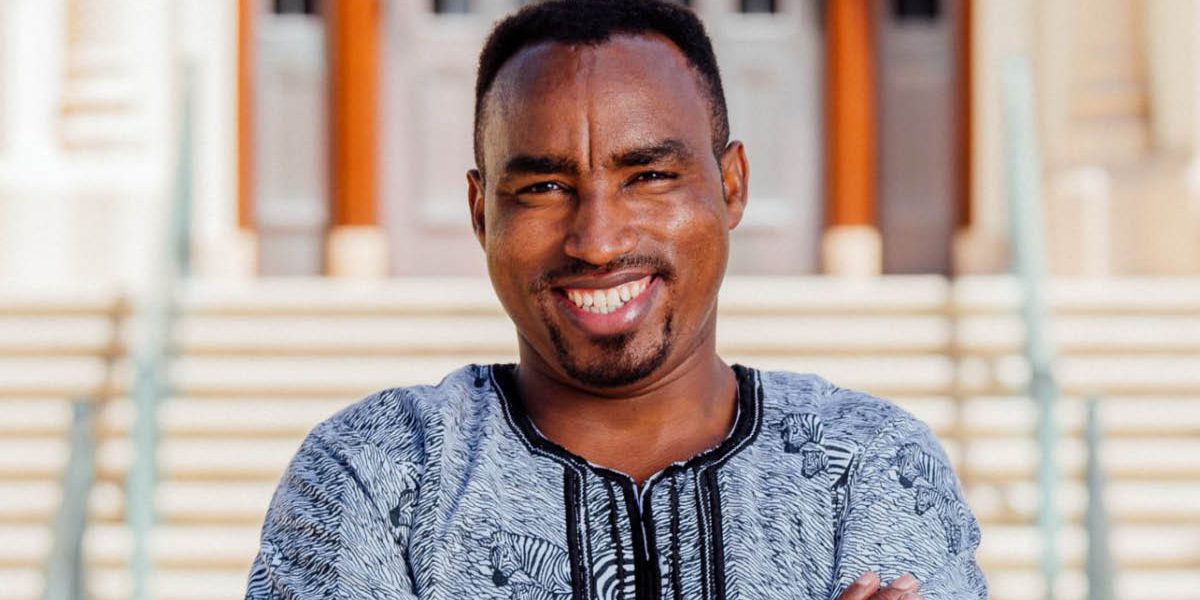
Jean Pierre Ndagijimana was born in Congo as a child of Rwandan refugees. He is now a Doctoral Candidate in International and Multicultural Education at the University of San Francisco (USF). At USF he is a Resident Minister working on Solidarity in Action (SIA) social justice volunteer programming. Jean Pierre also works at Partnerships for Trauma Recovery (PTR), a nonprofit where he provides psychosocial support to refugees and immigrants in the area.
Describe your life and what was happening when you first became involved with JRS.
I was born in the Congo to Rwandan parents who had been refugees in the country since 1959. Due to the chaotic situation of the 1990s that culminated in the 1994 genocide against the Tutsi, I found myself living in multiple refugee camps. I was first exposed to the JRS when I was living with my uncles in one of the refugee camps, a few years after I lost my father.
The utmost priority was to stay safe and to get a sufficient amount of food, firewood, and water that could keep us alive when we were living in the refugee camps. However, for almost every refugee, getting an education, whether formal or informal, was the only reason many endured the palpable pains, humiliations, hardships, and griefs. Education was our panacea, not just for its end results, but for the normalization, re-humanization, and the hopes it created in our hearts, minds, and homes.
Thinking about the experiences in the refugee camps, there were two competing powers: Going back to the country of origin and being able to afford food with the risk of being killed at any time, or staying in a refugee camp and waiting for unknown generous donors to offer a few pounds of corn kernels at the end of each month. Access to the education that JRS offered in the refugee camp made the death or life decision safer for many, including myself. Through JRS, I completed my upper primary school and my entire high school. I was completely dependent on JRS for my supplies of notebooks, pens, a mattress, transportation, health insurance, school fees, a bucket, a mat, a tooth brush, and other necessities. The JRS staff members were the only parents my school knew.
Where are you in your life today?
To whom much is given, much is expected. I have had lots of support ever since I was a boy to now. While it feels like I will forever be indebted, I have been trying to give back with Jesuit values and ongoing mentorships as my north stars. I am a Research Scholar, Visiting Global Fellow, and a Resident Minister coordinating Solidarity in Action (SIA) social justice volunteer programs at the University of San Francisco (USF). I am also working at Partnerships for Trauma Recovery (PTR), a nonprofit organization based in the Bay Area, where I am responsible for providing assistance in order to heal the psychosocial impacts of human rights violations among local refugees and immigrants. Specifically, I am a team member of both our African Communities Program and Survivors of Torture (SOT) Program in charge of Community Outreach and Education.
What difference did JRS make in your life?
I met JRS when I was in a troubled situation with no potential positive outcome. However, JRS helped me fulfill my craving for education. The impact of the opportunity was not limited to the sanctuary it created through school, but also gave me a bridge to help my family and other people that I support today. The transformative values of the JRS organization have been deeply instilled in me.
JRS talks about walking with the people we serve and accompanying them on their journeys. What does accompaniment mean to you?
When I think of accompaniment in the context of my relationship with JRS in the refugee camps, I see an image of an injured person, carrying a stick for his own stability at night when it is rainy. Fortunately, he is walking alongside a caring friend who does not have a stick, but an umbrella to cover them both. They walk side by side, trying to coordinate their steps. The one carrying the umbrella is aware that she is faster than the one who is injured and is willing to slow her pace. The injured one feels safer, loved, and is grateful that the person with the umbrella chose to stay by him walking in small steps. They have to walk back and forth because the path is steep and slippery. The person with the umbrella compassionately gives a hand to the injured one rather than putting him on to her shoulders. Learning to walk on his own is safer and more sustainable. Allowing the injured person to walk by himself with full support creates self-confidence, stamina, and is part of his healing process. As they walk, they are in a conversation, and if you heard them talking, you would not be able to tell which person is “injured” and which person is not. They both feel uncertain because they do not know when the rain will stop. However, they are in an active dialogue as they work together to find the safest way forward. When the rain stops, they both feel the sun. The person who carried the umbrella looks back at the journey they were on together. She can still see the trauma that has occurred, but she can also celebrate the endurance and the people they both became because of their shared journey.
This interview is part of a series recognizing our 40th Anniversary. You can find the whole series of interviews throughout the year on our international website.


